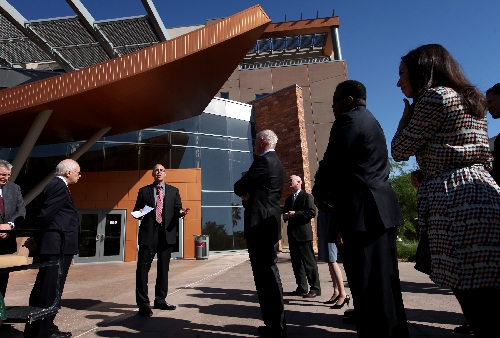Nevada regents doing what they can
To the editor:
On June 5, the Review-Journal published an ill-informed editorial alleging the Board of Regents was incapable of addressing the purported shortcomings within the Nevada System of Higher Education. The editorial was replete with erroneous conclusions.
First, you say the board should not approve implementation of reduced budgets solely through funding reductions and program eliminations. Unfortunately, those two actions will have to occur given the magnitude of the budget cut.
The system has experienced the largest reduction of any state agency, from $611 million per year in 2008 to $473 million by 2012 while serving more than 114,000 students. But cutting programs is not the only action the board has taken. The board has been aggressively pursuing significant reforms and restructuring at every campus for more than three years. In the months ahead, we will continue those reform efforts, which already include implemented efficiencies in business practices, technology, credits required for degrees and institutional collaborations.
Second, you indicate the universities have "open-door admission policies" and have not implemented higher admission standards. That is incorrect. Admission requirements have been raised to a level comparable to similar universities across the West and require a 3.25 GPA and prescribed coursework. There never has been a "longstanding mission of growing each college and university campus as big as possible." Instead, enrollment at Nevada institutions has kept pace with Nevada's expanding population.
Third, you indicated we should have raised tuition at the universities. The facts are student fees have dramatically increased over the past four years: 49 percent for university undergraduates, 60 percent for graduates, 43 percent for state college students, and 32 percent for community college students. The board adopted a four-point plan in March, which was submitted to the Legislature, calling for 13 percent increases in each of the next two years.
Fourth, you say that our campuses have too many "highly paid, nonteaching administrators and faculty." By any standard, this is simply not true. Nevada institutions have fewer employees per student than the national norm and our administrative employees are proportionately far fewer than most institutions.
Since Nevada's population boom started, our institutions have sought to find a balance between access and quality. While enrollment in most universities nationwide was flat, from 1986 to 2010, our enrollment increased from 47,150 to 114,809, fed by the growing Nevada population and increasing numbers of high school graduates. Yet we are now headed into our fifth consecutive year of budget reductions, reducing our annual appropriation by more than $138 million.
Fifth, the editorial suggests that the "campuses set about the very expensive process of building research programs ... " This is unwarranted criticism on the internationally recognized research being performed at the universities and Desert Research Institute. While research is expensive, it allowed Nevada institutions to garner some $300 million in research grants in 2010, which in turn generated many times that much for the Nevada economy. If Nevada is truly dedicated to diversifying its economy, we need more research, not less.
Our ongoing challenge is how to use ever-decreasing revenue to meet an ever-increasing demand, while providing an outstanding education that contributes to Nevada's urgent need to diversify its economy. Our economic future calls for a greater number of Nevadans with degrees, certificates and work force skills, as well as a strong research enterprise. Yet the board will unfortunately have to set priorities that will eliminate programs and opportunities for some students who might wish to attend college.
Education is a community-based endeavor and requires input and effort from all Nevadans if we are to succeed. We encourage your readers to get involved by going to www.nevada.edu to get the facts.
James Dean Leavitt
Las Vegas
Jason Geddes
Reno
Mr. Leavitt is chairman of the Nevada Board of Regents. Mr. Geddes is vice chairman.

















